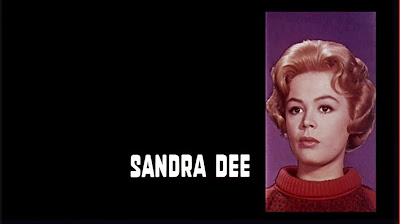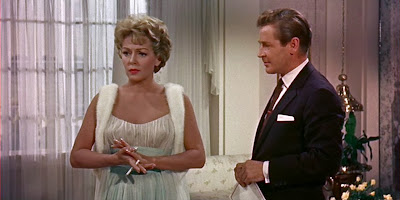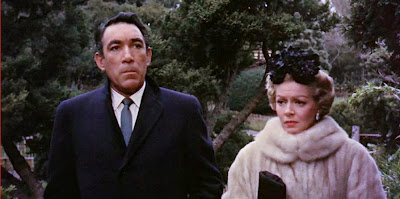Although I like to think of my taste in movies as being somewhat broad and varied, the sad truth is that I’m an oddly finicky film fan who only rarely steps outside of his comfort zone of favored tropes, themes, and genres. Case in point: as a rule, I don’t like war movies, westerns, sports films, or sci-fi; thus, there are a great many classic and perhaps marvelous motion pictures made in these genres which I have never seen...nor is it likely I ever will. That’s a hell of a lot of movies to cut out of one’s life. Of course, some of this boils down to plain old discernment (at age fifty-plus, I've seen enough western, war, sci-fi, and sports films to know that, by and large, they’re just not my cup of tea); but there's no denying that some of it is simply kneejerk prejudice and inflexibility.
Back in my film school days, before my opinions and preferences began to fully take shape (read: calcify), I was one of those guys who considered it time well-spent to sit and watch ANY kind of movie; for I was then of the mind that it was possible to learn as much from bad films as from good. Not anymore. When one reaches the age of 50 and beyond, the once-illusory concept of time becomes such a concrete concept, the idea of passing time suddenly morphs into wasting time, and with it, the dawning that the odds are not in your favor.
I've reached the stage where I don’t welcome spending my dwindling hours on this earth slogging through movies my cinephile Spidey-senses signal to me I’m not going to enjoy. These days, it’s my partner who takes the broadminded, democratic approach to movies, while I largely content myself with watching films I’ve already seen or films which I'm instinctively drawn to for whatever reason. I take my chances on the unfamiliar and uncharted only after they've been thoroughly dusted for signs of Tarantino; Sandler; auto racing; handguns held sideways; Katherine Heigl; or anyone wearing a cape and body armor.
I've reached the stage where I don’t welcome spending my dwindling hours on this earth slogging through movies my cinephile Spidey-senses signal to me I’m not going to enjoy. These days, it’s my partner who takes the broadminded, democratic approach to movies, while I largely content myself with watching films I’ve already seen or films which I'm instinctively drawn to for whatever reason. I take my chances on the unfamiliar and uncharted only after they've been thoroughly dusted for signs of Tarantino; Sandler; auto racing; handguns held sideways; Katherine Heigl; or anyone wearing a cape and body armor.
 |
| Knuckle Sandwich Anthony Quinn & Lana Turner engage in a little oral sex |
The only time my resolve weakens as to what films I positively, absolutely, will not watch, are on the occasions of my body weakening. Which is to say, when I’m confined to my bed and so sick with a cold or the flu that I’ll literally watch anything to keep my mind off of how miserable I’m feeling.
Occasionally this leads to my being subjected to unfortunate “entertainments” like Gene Kelly’s old coot comedy-western, The Cheyenne Social Club (1970); a film that, 15 minutes in, had me praying for a high-grade fever. But what I like best is when my incapacitated state brings about my exposure to (and enjoyment of) a film I might not otherwise have been inclined to sit through. Such is the case with Ross Hunter’s overdressed opus of melodramatic camp, Portrait in Black; a film I consciously avoided (rather surprisingly, given its reputation for overheated hysterics and histrionics) until it screened on TCM a few years back—when I was laid up with the flu—and has thereafter remained a lasting favorite. For all the wrong reasons.
Occasionally this leads to my being subjected to unfortunate “entertainments” like Gene Kelly’s old coot comedy-western, The Cheyenne Social Club (1970); a film that, 15 minutes in, had me praying for a high-grade fever. But what I like best is when my incapacitated state brings about my exposure to (and enjoyment of) a film I might not otherwise have been inclined to sit through. Such is the case with Ross Hunter’s overdressed opus of melodramatic camp, Portrait in Black; a film I consciously avoided (rather surprisingly, given its reputation for overheated hysterics and histrionics) until it screened on TCM a few years back—when I was laid up with the flu—and has thereafter remained a lasting favorite. For all the wrong reasons.
 |
| as Sheila Cabot |
 |
| as Dr. David Rivera |
 |
| as Cathy Cabot |
 |
| as Blake Richards |
Propping up all this material display is a workaday murder/suspense plot involving a cantankerous shipping magnate (Lloyd Nolan); his sexually frustrated wife, Lana Turner (“Too bad they can’t find a shot for your condition…a vitamin shot for ‘Love’ deficiency!”); and his morally conflicted physician, Anthony Quinn. Also thrown into the mix as sundry red herrings and narrative speed bumps of varying annoyance are Sandra Dee as the snippy stepdaughter; her scrappy, poor-but-honest suitor, John Saxon; and the dull-to-the-point-of-genius Richard Basehart as Nolan’s legal advisor.
Yes, Portrait in Black is one of those movies where even the phones are color-coordinated to the leading lady's wardrobe.
There’s nothing going on here that you haven’t seen about a million times before (and better), no plot point or suspense twist that isn't telegraphed ages before it occurs. But thanks to dated acting styles which result in theatrically stilted performances worthy of a Carol Burnett Show spoof; the uniquely kitschy look of early '60s high style (gold vein mirrors, Chinese Modern knickknacks, quilted headboards, gilt filigree); and producer Ross Hunter’s unparalleled gift for making every one of his films look as though it were made at least ten years earlier; Portrait in Black fails as legitimate drama in direct proportion to the heights it hits (and believe me, this movie soars!) as derisible, highly-entertaining camp.
Anyone with even a passing familiarity with this blog would think Lana Turner and Sandra Dee co-starring in a film produced by the man who gave us Lost Horizon, Tammy Tell Me True, AND the camptastic Doris Day classic Midnight Lace, would be a no-brainer of a must-see for a man of my particular “tastes.” But the truth is, I’m no great fan of Lana Turner (although I’ve always got a kick out of her very “movie star” name, for me she peaked, both in beauty and talent, in The Postman Always Rings Twice); and in spite of Ross Hunter’s reputation for being one of Hollywood’s foremost purveyors of inadvertent camp, I tend to find his static, studio-bound melodramas to be a little hard going.
Having previously endured his backpedaling remake of Imitation of Life and the arid romance of Magnificent Obsession, I wasn't exactly inclined to give Ross Hunter benefit of a “three strikes” vote when Portrait in Black was recommended to me: hours of my life irretrievably lost to two Ross Hunter productions was more than enough, thank you. Of course, now I see the only things wasted were all the years of laughter I deprived myself of by waiting so long to see this howler. Thank god for that miserable, debilitating, 6-day bout of influenza, huh?
 |
| Try not to look suspicious! |
WHAT I LOVE ABOUT THIS FILM
Where to start? There’s something sublimely liberating about watching a potboiler so superficial and devoid of subtext that after it’s over, you needn’t waste a second mulling over what it all signifies. It’s a pleasurable time-killer, pure and simple. And beyond being a tale of illicit lovers implicated in the suspicious death of a despised industrialist, and the thin mystery surrounding the identity of a blackmailer, Portrait in Black is true to Hunter’s oft-stated objective to “…(give) the public what they wanted. A chance to dream, to live vicariously, to see beautiful women, jewels, gorgeous clothes, melodrama.” Note that at no point does he mention credible storylines, good acting, or simple character development.
You gotta love the creaky screenplay by Ivan Goff and Ben Roberts (based on their 1945 play) wherein all the characters find it necessary to say each other’s names even when speaking face to face. It’s never“You mustn't!” when it can be, “David, you mustn’t!” Never, “Would you like fries with that?” when you can say, “Sheila, would you like fries with that?” This practice lends an air of comically mannered artificiality to all human interaction, which fortunately is right in step with the old-fashioned, histrionic performances director Michael Gordon (Pillow Talk, Move Over Darling) elicits from his cast. Even the reliably naturalistic (and, for my taste, tiresomely lusty) Anthony Quinn seems peculiarly hamstrung and stiff.
 |
| Dr. Rivera: "Look at this. It's more deadly than a gun...a thousand times less detectable!" A puncture from a hypodermic needle is less detectable than a big ol' gunshot wound? Imagine that. |
You gotta love the creaky screenplay by Ivan Goff and Ben Roberts (based on their 1945 play) wherein all the characters find it necessary to say each other’s names even when speaking face to face. It’s never“You mustn't!” when it can be, “David, you mustn’t!” Never, “Would you like fries with that?” when you can say, “Sheila, would you like fries with that?” This practice lends an air of comically mannered artificiality to all human interaction, which fortunately is right in step with the old-fashioned, histrionic performances director Michael Gordon (Pillow Talk, Move Over Darling) elicits from his cast. Even the reliably naturalistic (and, for my taste, tiresomely lusty) Anthony Quinn seems peculiarly hamstrung and stiff.
 |
| A real comic highlight is the hilarious rain-slicked drive along curvy coastal roads scene which has Turner more or less recreating her scream scene from The Postman Always Rings Twice |
PERFORMANCES
As members of Ross Hunter’s unofficial film repertory company, Lana Turner, Sandra Dee, John Saxon, and the ever-regal Virginia Grey had each, by the time they made Portrait in Black, developed a firm grasp on the overly sincere, purple dramatizing required of this kind of melodrama. And while I wouldn't go so far as to say any of them actually make fools of themselves, in certain scenes (the tormented curtain-pulling episode in particular), Lana Turner comes awfully close.
Indeed, Lana Turner takes all the prizes for making Portrait in Black so watchable for me because hers is one of those truly awful performances that only the committed can give. She's marvelous to look at, oozes star quality out of every pore, but I honestly haven't a clue as to what she's trying for in her scenes. Whatever it is, natural human behavior doesn't factor into it. She gives one of those Master Thespian "Movie Star" performances that torpedoes realism, but makes for a hell of an entertaining evening at the movies.
I've always found the troubled Sandra Dee to be a very appealing presence in movies, but here her innate charm is undermined a bit by the scornful, worrywart character she's saddled with. And by the efforts of Hunter and Universal Studios to glamorize and update the 17-year-old's teenybopper screen image. Personally, I kept hoping for Dee to break into her Tammy Tyree Mississippi twang and start lecturing these corrupt city folk on how much simpler life was down on the river with her grandpappy; all the while peppering her homey, colloquial diatribe with cute phrases like, "It's a puzzlement!"
THE STUFF OF FANTASY
A few of my favorite things:
THE STUFF OF DREAMS
I've always found the troubled Sandra Dee to be a very appealing presence in movies, but here her innate charm is undermined a bit by the scornful, worrywart character she's saddled with. And by the efforts of Hunter and Universal Studios to glamorize and update the 17-year-old's teenybopper screen image. Personally, I kept hoping for Dee to break into her Tammy Tyree Mississippi twang and start lecturing these corrupt city folk on how much simpler life was down on the river with her grandpappy; all the while peppering her homey, colloquial diatribe with cute phrases like, "It's a puzzlement!"
THE STUFF OF FANTASY
There are many categories of camp: there’s pretentious (Showgirls), clueless (Can’t Stop the Music), and my favorite--inadvertent. The enjoyment of pretentious camp is rooted in a kind of mean-spirited schadenfreude wherein you find yourself reveling in each failed attempt at legitimacy a film strives for. Clueless camp makes you shake your head over how out-of-touch the filmmakers can be, but can also make you feel a bit sorry for them (i.e. Mae West's Sextette). But inadvertent camp is guilt-free and the most enjoyable of the lot because the laughs come less at the expense of the individuals involved and more at how the passage time and the fickle finger of fate can turn what was once solemn into something that is now side-splitting.
The passage of time brings with it changing tastes and attitudes about everything from acting styles to fashion. So if a once-serious film falls victim to cultural shifts which render its content and themes outmoded (The Bad Seed), it’s nothing anyone could have foreseen, and laughing at it feels, well...just a little bit kinder.
The passage of time brings with it changing tastes and attitudes about everything from acting styles to fashion. So if a once-serious film falls victim to cultural shifts which render its content and themes outmoded (The Bad Seed), it’s nothing anyone could have foreseen, and laughing at it feels, well...just a little bit kinder.
A few of my favorite things:
 |
| Richard Basehart as family friend Howard Mason, making a play for "grieving" widow Sheila Cabot a day after the funeral |
 |
| Turner's mink-clad stroll through San Francisco's I. Magnin department store (complete with doorman!) |
 |
| Anthony Quinn going mano-a-mano with the Hippocratic Oath |
THE STUFF OF DREAMS
As fun as a movie like Portrait in Black can be for the occasional mindless diversion, reminding oneself that there was once a time when movies of this sort represented a sizable percentage of Hollywood's output always makes me grateful for the revolution in film that brought about the New Hollywood of the late '60s and '70s. Things really needed shaking up.
As Hollywood began to respond to the realist influence of European New Wave cinema and the naturalism of East Coast "Method" acting, old-school producers like Ross Hunter prided themselves on their efforts to bring "glamour" and old-fashioned family entertainment back to Hollywood movies. Hunter in particular made films that existed within a bubble of willful irrelevance so out of touch with the real world, they bordered on the surreal.
Although he was gay, Hunter made films promoting staunchly status-quo heteronormative values which featured men and women occupying traditional gender roles, and people of color depicted, if perhaps more plentifully than many of his peers, always as occupying positions of a non-threatening, subordinate status. And, as befitting the times and Hunter's own closeted always-appear-in-public-with-a-beard-on-your-arm inclinations; gays were invisible or non-existent except as humorous reference points in his sex comedies.
As Hollywood began to respond to the realist influence of European New Wave cinema and the naturalism of East Coast "Method" acting, old-school producers like Ross Hunter prided themselves on their efforts to bring "glamour" and old-fashioned family entertainment back to Hollywood movies. Hunter in particular made films that existed within a bubble of willful irrelevance so out of touch with the real world, they bordered on the surreal.
 |
| Portrait in Black marked the third and final screen pairing of John Saxon and Sandra Dee |
Although he was gay, Hunter made films promoting staunchly status-quo heteronormative values which featured men and women occupying traditional gender roles, and people of color depicted, if perhaps more plentifully than many of his peers, always as occupying positions of a non-threatening, subordinate status. And, as befitting the times and Hunter's own closeted always-appear-in-public-with-a-beard-on-your-arm inclinations; gays were invisible or non-existent except as humorous reference points in his sex comedies.
Ross Hunter's films understandably struck a chord with those of an older demographic. Those moviegoers left bewildered by cinema's new permissiveness (or the term cinema, for that matter) and still enamored of the perhaps apocryphal Samuel Goldwyn quote, "If you want to send a message, use Western Union!" So while college kids in 1960 were lining up to see Jean-Luc Godard's Breathless, Ross Hunter was getting rich (and very little in the way of respect) releasing Portrait in Black, a movie so timely it was once considered as a vehicle for Joan Crawford.
I'm not familiar enough with Ross Hunter's work (and too much the devotee of '70s movies) to appreciate his contribution to film. But as a connoisseur of camp and good/bad movies, the outmoded, overdressed, overemotional charm of Portrait in Black places him high on my list of those who have made the most significant contributions to guilty-pleasure cinema.
BONUS MATERIAL
If you're a fan of Ross Hunter or late-career Lana Turner, check out these sites:
A terrific review of Imitation of Life can be found at Angelman's Place
Read all about Lana in Madame X at Poseidon's Underworld
I'm not familiar enough with Ross Hunter's work (and too much the devotee of '70s movies) to appreciate his contribution to film. But as a connoisseur of camp and good/bad movies, the outmoded, overdressed, overemotional charm of Portrait in Black places him high on my list of those who have made the most significant contributions to guilty-pleasure cinema.
BONUS MATERIAL
If you're a fan of Ross Hunter or late-career Lana Turner, check out these sites:
A terrific review of Imitation of Life can be found at Angelman's Place
Read all about Lana in Madame X at Poseidon's Underworld














0 Yorumlar